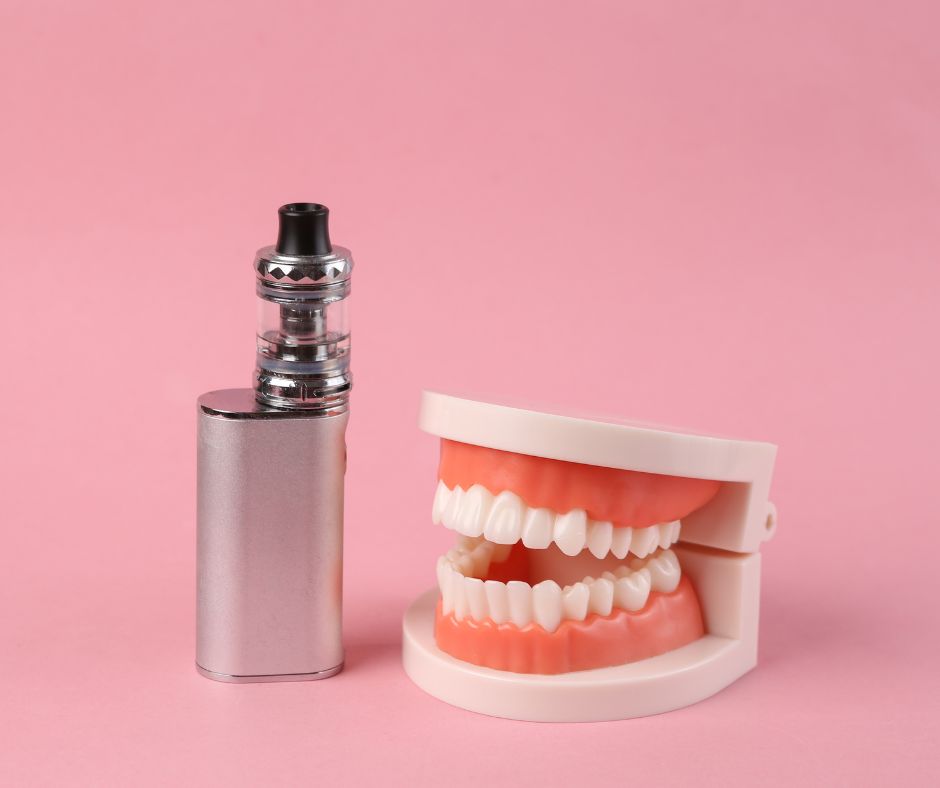
What is Vaping?
Vaping refers to the act of inhaling and exhaling aerosol, often referred to as vapor, produced by an electronic cigarette (e-cigarette) or other vaping devices like vape pens. These devices are battery-powered and heat a liquid (usually containing nicotine, flavorings, and other chemicals) to create an aerosol, which is then inhaled. They have become extremely popular because of the different flavors, the fact that you can currently use the e-cigarette devices indoors, and because they come in many different styles (including ones that look like USBs – parents, just a heads up).
The Real Effects of Vaping on Your Dental (and Overall) Health
At our office, we are seeing more and more patients who are vaping. While from the outside it may seem like a healthier alternative to nicotine, it really is just better at masking the dangerous health effects. Here is the truth about what happens when you vape:
- Dry Mouth: Vaping, like smoking, can contribute to dry mouth. This reduction in saliva flow increases the risk of tooth decay and gum problems because saliva plays a crucial role in neutralizing acids, washing away food particles, and protecting teeth.
- Nicotine Impact: Many vaping liquids contain nicotine, which can lead to vasoconstriction (narrowing of blood vessels) and reduced blood flow. This can affect the health of the gums and contribute to gum disease. Nicotine can also contribute to teeth grinding (bruxism), which can lead to tooth damage and jaw discomfort.
- Gum Irritation and Inflammation: The chemicals in vaping liquids, including flavorings and other additives, may irritate the gums and contribute to inflammation. Gum irritation can lead to various issues, including redness, swelling, and bleeding.
- Cellular Damage: Some studies suggest that exposure to the chemicals in vaping liquids may lead to cellular damage. This damage can affect the oral tissues, including the gums and soft tissues in the mouth.
- Tooth Sensitivity: Vaping liquids may contain acidic components that can contribute to tooth enamel erosion. Erosion can lead to increased tooth sensitivity and a higher risk of cavities.
- Altered Microbial Environment: Vaping can alter the microbial environment in the mouth, promoting the growth of harmful bacteria. This imbalance can contribute to oral health issues such as cavities and gum disease.
- Oral Cancer: While rare, vaping can lead to serious oral diseases like Periodontitis and even oral cancer.
In addition to the awful things that vaping can do to your teeth and mouth, people who vape are also at an increased risk of respiratory viruses and diseases, including cancers of the throat and lungs. They are also more likely to experience cardiovascular disease, stroke, and heart attacks.
Committed to Oral Health and Dental Disease Prevention
Susan Ellison Dentistry & Cosmetics is committed to spreading awareness about things that may impact your oral health – that includes even the most popular of trends. While vaping may give a short burst of endorphins or even make you feel relaxed, it isn’t worth the damage to your teeth, gums, mouth, throat, and overall health. If you have been vaping, it might be a good time to schedule a routine cleaning and exam to make sure your dental health is okay. During this exam, Dr. Ellison can also speak with you about resources for quitting or additional reasons to think about setting the vape aside.